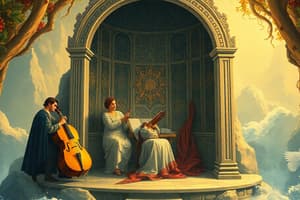Podcast
Questions and Answers
What was the earliest form of music likely used by early humans?
What was the earliest form of music likely used by early humans?
- The human voice (correct)
- Rudimentary flutes made of animal bones
- Gregorian chants
- Simple percussion instruments made of rocks and wood
Who is credited with developing Gregorian chants?
Who is credited with developing Gregorian chants?
- Martin Luther
- King Henry VIII
- Pope Gregory I (correct)
- Pope Gregory II
What was the primary purpose of music during the Early First Century?
What was the primary purpose of music during the Early First Century?
- To glorify the royal family
- To entertain the masses
- To promote cultural unity
- For the 'glory of God' (correct)
What developed during the Middle Ages/Medieval Period of Music?
What developed during the Middle Ages/Medieval Period of Music?
During which period did music become popular with all walks of life?
During which period did music become popular with all walks of life?
What was a characteristic of music compositions during the Middle Ages/Medieval Period?
What was a characteristic of music compositions during the Middle Ages/Medieval Period?
Which composer is associated with Poland?
Which composer is associated with Poland?
What is the term for multipart music?
What is the term for multipart music?
Which period saw a merging of 'popular' and 'serious' music?
Which period saw a merging of 'popular' and 'serious' music?
Who is credited with contributing to the development of polyphonic music?
Who is credited with contributing to the development of polyphonic music?
What is the name of the composition that obtained legitimacy on the international concert stage?
What is the name of the composition that obtained legitimacy on the international concert stage?
Where did European composers and performers spend a significant part of their careers during the Renaissance?
Where did European composers and performers spend a significant part of their careers during the Renaissance?
Flashcards are hidden until you start studying
Study Notes
Music History
Music history is a fascinating subject that spans centuries and cultures. It has evolved from simple melodies created by early humans to the complex compositions we hear today. This article will provide a brief overview of the history of music, focusing on key figures, instruments, and periods.
Early Humans
The earliest form of music was likely the human voice, used for communication, storytelling, entertainment, or mimicking sounds from the natural world. Early humans also used animal bones as rudimentary flutes and rocks and pieces of wood as simple percussion instruments.
Early First Century
During this time, music was primarily featured in monasteries and abbeys. Pope Gregory I is credited with developing Gregorian chants, which were created from sacred writings in Latin. Music of this time was reserved and produced for the "glory of God".
The Middle Ages / Medieval Period of Music (500 AD – Mid-1600s)
Music during this period became popular with all walks of life, from peasants to royalty. This period also coincides with the development of music notation. Much of this written music has survived, allowing us to look back on these times with greater accuracy than anything that came before. Music compositions became more beautiful and elaborate, giving them greater range and allowing composers to create more emotional and elaborate compositions.
Key Musicians
Key figures in musical history include Hildegard von Bingen and Perotin, who contributed to the development of multipart music, known as "polyphonic". Germany produced Felix Mendelssohn and Robert Schumann, while pianist Frederick Chopin rose to prominence in Poland. France gave us Hector Berlioz.
20th Century and Beyond
The 20th century saw a significant shift in music, with dramatic changes coming from France. Notable composers from this period include Arnold Schoenberg, Claude Debussy, Igor Stravinsky, and Dmitri Shostakovich.
The Renaissance
The Renaissance period saw a new understanding and interpenetration of music, with European composers and performers spending a significant part of their careers in America. This period also saw the merging of "popular" and "serious" music, with George Gershwin's "Rhapsody in Blue" obtaining legitimacy on the international concert stage.
Music Today
Today, music is still evolving, with composers continuing to produce beautiful and complex works. The classical music tradition, which began with the music written for and by the early Christian Church, continues into medieval music, where polyphony was developed, and into the modern era.
Conclusion
Music history is a rich tapestry of development and evolution. From its humble beginnings among early humans to the complex compositions of today, music has been a constant presence in human culture. As we continue to explore the history of music, we gain a deeper appreciation for the artists and composers who have shaped this art form over the centuries.
Studying That Suits You
Use AI to generate personalized quizzes and flashcards to suit your learning preferences.




